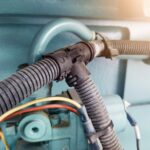
Installing wire harness connectors accurately is vital for electrical system assembly. This article explores methods and best practices for mastering the art of wire harness connector installation to enhance performance across industries.
Installing wire harness connectors involves individuals firmly attaching cables and wires to connector terminals to provide stable electrical connections. Proper installation methods are crucial to avoid loose connections, damaged wires, and electrical malfunctions.
Using crimping tools that match the wire gauge and terminal size being used ensures individuals achieve a secure connection between terminals and wire ends.
To expose the conductive core for correct termination, insulation on wire ends must be removed, which requires the use of wire strippers.
Heat recoil tubing gives protection and security to creased associations, fixing out dampness and preventing erosion.
Connector lodgings hold terminals set up and give a solid nook to wire associations. Select lodging sizes and setups suitable for the application.
Ensure you cut wires to the right length and remove insulation to expose the conductive core. Use wire strippers to carefully remove insulation, avoiding damage to the wire strands.
Utilize the proper creasing apparatus and method to append terminals to safely wire closes. Apply even strain to the pleating instrument jaws to make a tight and solid association without harming the wire or terminal.
Apply heat contract tubing over pleated associations with give protection and strain alleviation. Use intensity to contract the tubing and make a tight seal around the association, forestalling dampness and upgrading strength.
Insert crimped terminals into the connector housing in the right direction, ensuring proper alignment and engagement. Secure the housing with locking mechanisms or latches to prevent accidental disconnection.
Installing wire harness connectors requires skill and expertise to ensure proper connections and reliable performance. Manufacturers and construction agents must adhere to industry standards and regulations to achieve consistent results and meet quality requirements.
Mastering the art of wire harness connector installation is fundamental for individuals to achieve reliable electrical connections and optimal performance in various applications. Individuals can ensure successful installations by utilizing the right tools and following proper procedures. Adhering to best practices is crucial, as it enhances overall product quality and reliability.
1. Why is proper wire harness connector installation important?
Proper installation ensures reliable electrical connections, forestalling free associations, wire harm, and electrical disappointments.
2. What tools are needed for wire harness connector installation?
Devices required incorporate creasing apparatuses, wire strippers, heat recoil tubing, and connector lodgings.
3. What are some best practices for wire harness connector installation?
Best practices incorporate appropriate wire arrangement, the right pleating techniques, protection and strain alleviation, and secure connector lodging gathering.
4. How can I ensure a secure and reliable wire harness connector installation?
Guarantee the appropriate arrangement and commitment of terminals in the connector lodging, and use securing systems or clasps to secure the lodging.
5. Can I find industry standards and guidelines for wire harness connector installation?
Industry associations and norms bodies give rules and guidelines for wire harness connector installation, which can be tracked down in their distributions and assets.